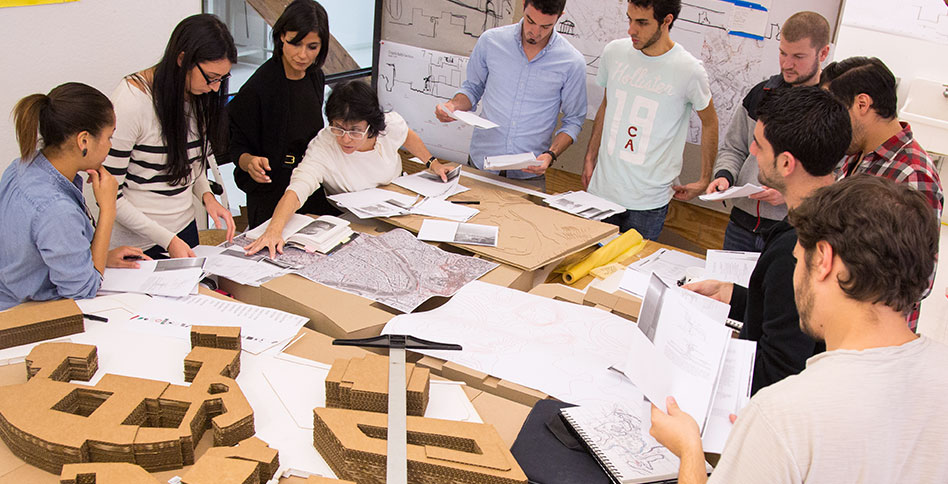
Studio Culture Statement
The National Architectural Accrediting Board (NAAB) asks that all schools of architecture have a written policy that describes the culture of the design studio and the expectations of students and faculty involved in studio-based education. This policy defines the school’s fundamental values of cultural learning and teaching of optimism, respect, sharing, engagement, and innovation between and among the members of its faculty, student body, administration, and staff. The faculty and administration strongly encourage and support student and faculty participation in developing and revising this document, via the school’s Student Affairs Committee and student organizations.
SoAD Learning and Teaching Culture
The SoAD Learning and Teaching Studio Culture Policy is built upon the school’s mission and policies of holistic development and shared values. Our interdisciplinary, studio-based culture and pedagogy promote diversity and inclusion which are fundamental to New York Tech’s borderless studio culture. As we seek professional and design excellence in coursework, our integrative studio model promotes mutual respect and supports a community that welcomes, celebrates, and embraces its members’ diverse backgrounds, opinions, approaches, ideas, beliefs, orientations, and dignity.
The STUDENT
New York Tech empowers students with leadership models, opportunities and skills for lifelong learning, and the essentiality of community engagement in our professional stewardship of the built environment. New York Tech promotes design agency and optimism as we train next-generation design professionals to contribute to society’s wellbeing, and its increasingly sustainable built environments. Students are encouraged to participate in faculty committee discussions and deliberations. As they are encouraged to achieve the very best they can as individuals, students also learn collaboration and leadership abilities as they reimagine and shape our shared future, environment, and community.
The FACULTY
SoAD faculty members represent a cross-section of the profession, with members at every career stage, from recent graduates to seasoned professionals with decades of successful practice. This diversity of experience, approach, and specialization - from specific building types such as housing, infrastructure, multi-use projects, or interior architecture and expertise among engineers, sustainability experts, and computational designers - allows us to be both cross-disciplinary within our department and to collaborate with faculty members from other academic units within New York Tech and with other academic institutions and professionals.
The STUDIO COMMUNITY
Personal safety is vital to personal wellbeing, learning, development, and the health of our community. The evolving learning and teaching space, comprising the studio, classroom, fab lab, and hybrid remote campus and personal locations, is a safe and secure academic setting, providing the appropriate context for individual and group education, interaction, and innovation. Students enjoy support and mentoring while engaging in free and open collegial exchange, where experimentation and risk-taking are valued and encouraged. The classroom, the studio, and fab-lab are creative incubators and venues for expressive freedom, fostering open dialogue and respectful exchange of emergent issues and ideas.
The STUDIO METHOD
The studio provides a positive, empathetic, collegial design laboratory environment. The design studio teaching model is project and process-based where ‘learning by doing’ is conducted in a supportive, collaborative dialogue to develop methods for engaging architectural issues and ideas.
Instructors are dedicated, responsible, and effective in providing students with supportive guidance in the transfer of knowledge, skills, and experience to prepare them for life-long learning and practice. Shared learning, project, and workflow goals are outlined, developed, and aligned with outcomes and assessment metrics. The studio method encourages intelligent debate and informed discourse, and advocates proactive agency in the realms of ethical judgment, critical reasoning, advanced technologies, and tools for design research and production.
DESIGN
Education is a fundamental right that empowers students with tools and knowledge to grow and develop a robust and cumulative, life-long process for learning, planning, making, and reflection. Emphasis is on research, design, and practicum-based learning to prepare students for leadership in the design and stewardship of the built environmental and resilient communities. Design provides agency for innovation to address and anticipate integrated strategies, for environmental, health, economic, and social issues.
INNOVATION & TECHNOLOGY
Change and adaptability are reciprocal constants requiring innovation and entrepreneurship in applied research and technology. Architecture is empowered as the agency for creating and sustaining the built environment. Our mission is dedicated to the development and deployment of technology resources to optimize our creative and professional work. The school’s dynamic learning and teaching space proactively integrates advanced emerging technology, interdisciplinary collaboration, and new adaptable working methods, towards applied research opportunities, and to generate new relevant models and tools to equip emerging architecture professionals.
The school’s integrated technology approach facilitates the school’s dual campus and international learning and teaching clusters. The school’s required laptop policy empowers students to expand the dynamic digital studio, fab lab, robotics lab, AR/VR labs, HIVE, plot shop, and remote learning and teaching modalities to support borderless studio culture.
The physical studio setting is an open, shared community space with work stations, Wi-Fi, digital projection, conference ready space. The studio space is comfortable, efficient, adaptable, and technologically sophisticated to support the optimal teaching and learning requirements for students and faculty on campus and remotely. Integration of advancing technologies expands opportunities for diverse communities for integrative research and open-source sharing.
The Fab Lab is a pedagogically driven learning center. Staff serve in multiple roles including training students and faculty in software and equipment as well as providing integrated teaching, tutorial, and mentoring to support studio curricula, pedagogy, and projects.